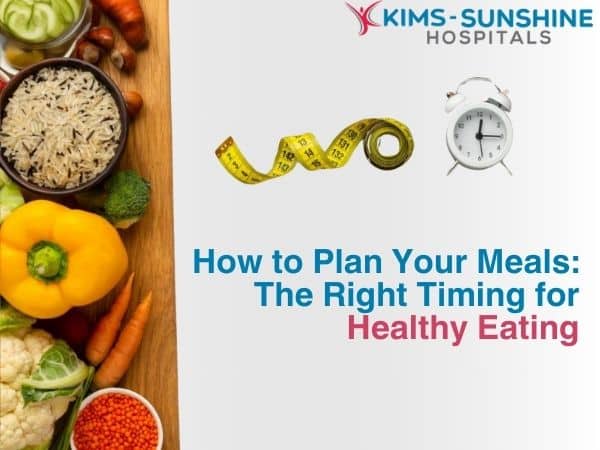
How to Plan Your Meals: The Right Timing for Healthy Eating

We all think that eating three square meals a day, not snacking and drinking plenty of water is a good routine to follow. Sure, it is but when do you eat those meals? Do you space them out properly? Or do you end up skipping meals and then binge eat and feel super guilty about it? Timing your meals is a good double edged sword- you don’t feel the need to snack and still feel hungry enough to eat the next meal with great relish. So, it is time for us to understand why it is so important to eat well and eat well on time.
Meal Planning For Better Health
Meal planning is just another fancy way of saying that you need to plan your meals in advance. You can do it with some time. Trust us – having a routine like this will greatly help if you have work or kids to send off to school. Plan it out on the weekends so you can go autopilot for the week. The benefits of meal planning go hand in hand with eating on time too, since they are so intricately linked to each other.
Why do we insist that eating out is not great? They don’t compromise on taste for sure, but health benefits? They have copious amounts of oil and cream – something we wouldn’t normally include in our meals at home. They may have food colouring and other additives which are harmful in the long run. Portion size also- everyone wants value for money and so will end up ordering more. Now imagine stuffing yourself because you don’t want to waste food? Bad idea, but it has been ingrained in us from childhood- don’t waste anything. Finish everything.
How To Create A Meal Plan?
Alright, now you want to eat at home but how do you go about it? By planning a meal in advance. You can do that easily by taking a close look at all the items you have in your kitchen and refrigerator. Include lots of fresh fruits and not juices to your meals. Go out to the vegetable market and look at all the fresh produce available. Buy some of them to last you a week or two. Now, you can chop them up and keep them in boxes in the refrigerator, for you to prepare a meal the next day. Get some eggs or paneer or soy and pulses for some powerful protein. You can come up with easy recipes that can be prepared in a short span of time for a whole week. If you are okay with the same stuff the next week, then cool. Or you can come up with a second set of recipes for week 2. Then for weeks 3 and 4, you can switch between them and try something new on the weekends. Try it for one week at a time.
Benefits Of Regular Meal Times
Now that you understand what meal planning is, let us introduce another crucial aspect – eating on time. Space your meals out and eat whenever you feel hungry. The 3 square meals a day strategy does not work for everyone all the time. The pros of eating when you are hungry and keeping a watch on portion size are:
- Better blood glucose level management – say no to diabetes this way.
- You can stay at a healthy weight and may not gain too much if you do binge at times.
- Your liver gets a better chance of processing all toxins and related molecules.
- Your gut gets better at absorbing necessary nutrients.
- You will not think about snacking.
- You won’t feel lethargic.
- Your oral health is also going to get better.
- Your cardiovascular system will thank you for not clogging them with cholesterol and forcing your heart to work extra hard.
- Very important- you will get some good quality sleep too!
Conclusion
Instant food delivery is an amazing invention for the average lazy human being. Order online and keep twiddling your thumbs for a good 30-40 minutes before the food shows up. You can eat it right out of the fancy packaging used and there is no need to do the dishes either! Total win-win, yes? No! You can afford to eat out a few times a month, but don’t make it a daily ritual. Drumroll – enter the concept of ‘meal planning’. After you have got the hang of it, introduce another level of so-called difficulty – eating meals at the right times during the day. Keep doing this and you will feel invincible!
Frequently Asked Questions
What is the best time to eat breakfast, lunch, and dinner?
Breakfast needs to be eaten within an hour of waking up, lunch – in about 4-5 hours after breakfast and dinner – you can try to push it to before 8pm. If the gaps may get too long, permission to snack is granted.
How often should I eat throughout the day?
Eating food every 4 hours or so is a good way to keep your blood glucose steady, manage hunger and prevent junk food consumption. This means snacking on healthy alternatives is always a good idea.
What are the benefits of eating smaller, frequent meals?
Your stomach has a finite capacity to work with, so if you eat smaller portions of food, there is greater chances of it getting digested properly. This will also mean you get all the nutrients from the meal.
Is it better to eat dinner earlier or later for better health?
Early dinners are best for your system. This will mean that you will sleep better and won’t have to deal with any acid reflux from a heavy meal. You can also lose some kilos with this strategy.
Can meal timing impact digestion and energy levels?
Your body has a clock in its brain – called the circadian rhythm, and eating meals at the right time will help you manage your daily routine better. You won’t feel super full and lethargic with portion control. Energy levels are more or less the same through the day and you won’t feel like crashing.

Ms. Bhavana K.
M.Sc (Nutrition & Dietetics)
HOD – Chief Dietician






